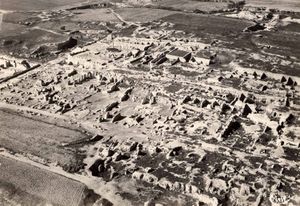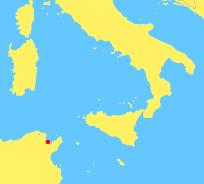Carthago delenda est
"Ceterum censeo Carthaginem esse delendam" أو "Ceterum autem censeo Carthaginem esse delendam" (بالعربية: "بالاضافة لذلك، فأنا أعتقد أن قرطاج يجب أن تـُدمـَّر") والتي كثيراً ما كان يختصرها إلى "Ceterum censeo"، "Carthago delenda est"، أو "Delenda est Carthago"[1] (بالعربية: "قرطاج يجب أن تـُدمـَّر") هي عبارة خـُطابية لاتينية شاع استخدامها في الجمهورية الرومانية في القرن الثاني ق.م. أثناء الأعوام الأخيرة من الحروب الپونيقية ضد قرطاج، من قِبل الحزب المطالب بسياسة خارجية تسعى للقضاء على أي تهديد محتمل للجمهورية الرومانية من غريمتها القديمة قرطاج، التي انهزمت مرتين أمام روما من قبل وأظهرت ميلاً بعد كل هزيمة أن تعيد بناء قوتها بسرعة وتدخل في مزيد من الحروب. وقد مثلت العبارة سياسة استئصال أعداء روما الذين يقومون بالعدوان، ورفض معاهدة سلام كوسيلة لإنهاء النزاع. أشهر من تفوّه بالعبارة بكثرة كان السناتور الروماني كاتو الأكبر (234–149 ق.م.)، كجزء من خطبه.
تحليل نحوي
The phrase employs delendum, the gerundive of the verb deleo, "to destroy".[2] The gerundive (or future passive participle) delendus is a verbal adjective that may be translated as "to be destroyed". When combined with a form of the verb esse ("to be"), it adds an element of compulsion or necessity, yielding "is to be destroyed", or, as it is more commonly rendered "must be destroyed". The gerundive delendus functions as a predicative adjective in this construction,[3] which is known as a passive periphrastic. Carthago being a feminine noun, the feminine gender delenda of the gerundive is applied. The fuller forms Ceterum censeo Carthaginem esse delendam or Ceterum autem censeo Carthaginem esse delendam use the so-called accusative and infinitive for the indirect statement.
خلفية تاريخية
بالرغم من أن الرومان كانوا ناجحين في الحربين الپونيقيتين الأولى والثانية، في سياق سعيهم لفرض هيمنتهم على المدينة-الدولة الفينيقية البحرية قرطاج في شمال أفريقيا (تونس الحالية)، فقد عانوا عدداً من الإهانات والنكسات أثناء تلك الاشتباكات، وخصوصاً في معركة كاناي (216 ق.م.). وتطور ذلك إلى موقف ساعي للانتقام ولإحراز نصر شامل، وهو ما عبرت عنه تلك العبارة. وأخيراً تم محو مدينة قرطاج من الوجود على يد الجنرال الروماني سكيپيو إميليانوس بعد معركة قرطاج الثالثة في 146 ق.م.، وكل ما تبقى من سكانها بيعَ عبيداً. وبذلك فلم تعد تشكل تهديداً مرة أخرى لروما.[4] الأسطورة الحديثة أن المدينة حـُرِثت بالملح تعكس وحشية تدميرها.
المصادر الأدبية التاريخية
Although no ancient source gives the phrase exactly as it is usually quoted in modern times (either Carthago delenda est or the fuller Ceterum censeo Carthaginem esse delendam), according to several ancient sources the Roman statesman Cato the Elder frequently if not invariably ended his speeches in the Senate with a variant of this expression even when his speech had been totally unrelated to Roman foreign policy towards Carthage.[5] The main ancient sources, all of which written at least 200 years after Cato's death, are:
- پلوتارخ، سيرة كاتو في كتابه "حيوات متوازية"، المكتوب باليونانية، والذي دوّن تعبير كاتو كالتالي "δοκεῖ δέ μοι καὶ Καρχηδόνα μὴ εἶναι."[6]
- پلني الأكبر، في كتابه "التاريخ الطبيعي"، 15.23: "[كاتو] clamaret omni senatu Carthaginem delendam."
- أورليوس ڤيكتور في كتابه De Viris Illustribus, 47.8.: "Carthaginem delendam censuit."
- ليڤي، Ab Urbe Condita, XLIX.
- فلورس، Epitoma de Tito Livio bellorum omnium annorum DCC, Liber primus, XXXI.[7] "Cato inexpiabili odio delendam esse Carthaginem... pronunciabat."
The evolution of the phrasing towards its modern forms has been considered by Silvia Thürlemann, in her article Ceterum censeo Carthaginem esse delendam in the journal Gymnasium 81 (1974).
استخدامات معاصرة
A common modern use in order to emphasise to third parties the strength of one's opinion about a perceived necessary course of action is to add either at the beginning or the end of a statement the two opening words "Ceterum censeo..."
The phrase is sometimes fully adapted in modern usage, as a learned reference to total warfare.[8] In 1673 the English minister Anthony Ashley Cooper, 1st Earl of Shaftesbury revived the phrase in the form "Delenda est Carthago" in a famous speech before Parliament during the Third Anglo-Dutch War, comparing England to Rome and the Dutch Republic to Carthage. The pro-German radio station Radio Paris in occupied France between 1940 and 1944 had "England, like Carthage, shall be destroyed!" as its slogan. Ben Klassen, the founder of the anti-Semitic Church of the Creator, adopted the phrase for his movement, modifying it to Delenda est Judaica, "Judaism must be destroyed".[9] The phrase was used as the title for Alan Wilkins' 2007 play on the Third Punic War.[10]
In Isaac Asimov's novel Robots and Empire, Dr. Mandamus uses a note with the phrase in order to convince Kelden Amadiro to see him about his plan of destroying Earth, which they both consider the ultimate enemy of the Spacer worlds. In this case, the phrase is written as "Ceterum censeo, delenda est Carthago" and Mandamus translates it as "In my opinion, Carthage must be destroyed".
الهامش
- ^ ترتيب الكلمات "Delenda est Carthago" هو أكثر رشاقة لأغراض خـَطابية
- ^ Cassell's Latin Dictionary, ed. Marchant & Charles. Deleo is actually "I destroy"; by convention, the present tense first person singular is used to identify Latin verbs where the infinitive is used in English
- ^ Betts, Gavin, Teach Yourself Latin, Sevenoaks, 1992, p.125
- ^ Lempriere's Classical Dictionary
- ^ Charles E. Little, "The Authenticity and Form of Cato's Saying 'Carthago Delenda Est,'" Classical Journal 29 (1934), pp. 429-435.
- ^ 27 (δοκεῖ δέ μοι καὶ Καρχηδόνα μὴ εἶναι)
- ^ 1.31
- ^ [1]
- ^ G. Michael (2009), Theology of Hate: A History of the World Church of Creation (University of Florida Press) p. 26.
- ^ Traverse Theatre website


